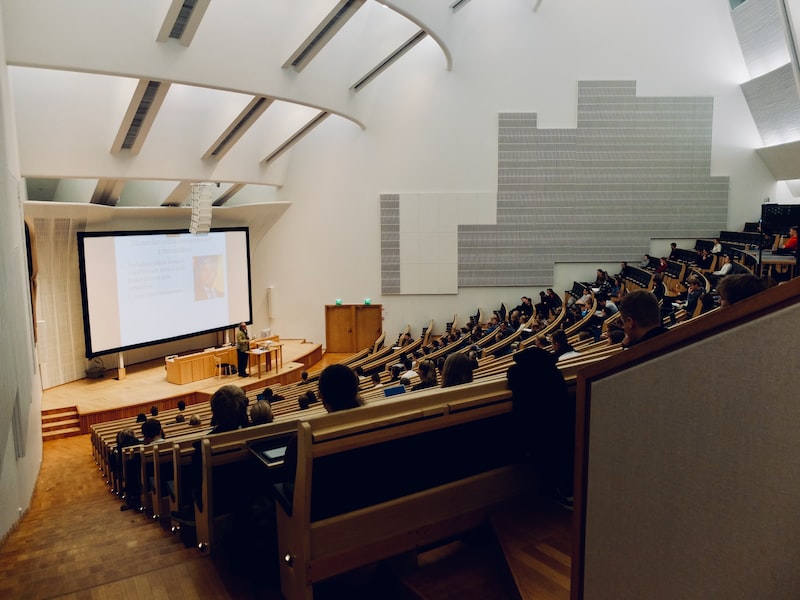Sure! Here’s a 300-word article on the topic of “The Influence of Nobel Laureates in Top Universities”:
Have you ever wondered what makes the top universities truly exceptional? One significant factor that sets them apart is the presence and influence of Nobel Laureates. These esteemed individuals, recognized for their outstanding contributions to various fields, bring immense prestige, expertise, and inspiration to the academic community.
When Nobel Laureates are associated with a university, they create an environment that nurtures brilliance and innovation. Their presence attracts talented students, esteemed faculty, and groundbreaking researchers from around the world. As a result, these universities become hubs of intellectual curiosity and cutting-edge research.
The impact of Nobel Laureates goes beyond inspiring individuals; it extends to the broader academic landscape. They often establish research institutes, centers, or programs within their affiliated universities, which focus on their respective areas of expertise. These initiatives not only foster collaboration but also attract more funding and grants, further enhancing the university’s research capabilities.
Moreover, Nobel Laureates frequently engage in mentoring young scholars, guiding them on their academic journeys. Their mentorship provides invaluable guidance, opening doors for aspiring researchers and helping them refine their ideas. This interaction with laureates can be transformative, shaping the perspectives and careers of future generations of scholars.
Universities boasting Nobel Laureates also benefit from increased visibility and reputation. These laureates act as ambassadors, representing the institution’s excellence on a global stage. They often participate in conferences, deliver lectures, and collaborate with other leading experts worldwide, solidifying the university’s position as a center of academic excellence.
In conclusion, the influence of Nobel Laureates in top universities cannot be overstated. They bring prestige, attract talent, and foster a culture of innovation and research. Through their initiatives, mentorship, and global collaborations, they contribute significantly to the advancement of knowledge and inspire generations to push the boundaries of human understanding.
Contributions of Nobel Laureates to Research and Academia
Nobel Laureates have left an indelible mark on the world of research and academia. Their groundbreaking contributions have shaped our understanding of various fields, pushing the boundaries of knowledge and sparking innovative ideas. In this article, we will explore the remarkable impact that Nobel Laureates have had on the realms of science, literature, peace, and economics.
In the realm of scientific research, Nobel Laureates have revolutionized our understanding of the natural world. From Marie Curie’s pioneering work on radioactivity to Albert Einstein’s theory of relativity, these brilliant minds have uncovered fundamental truths about the universe. Their discoveries have paved the way for advancements in medicine, technology, and countless other disciplines, improving the lives of people worldwide.
Not limited to the sciences, Nobel Laureates in literature have crafted words that resonate with readers across cultures and generations. Their literary works delve into the depths of human experience, exploring complex themes and evoking profound emotions. Through their storytelling prowess, writers like Gabriel Garcia Marquez and Toni Morrison have brought attention to social issues and sparked important conversations.
The Nobel Peace Prize recognizes individuals who have tirelessly worked towards global harmony and the resolution of conflicts. Icons like Martin Luther King Jr., Malala Yousafzai, and Nelson Mandela have dedicated their lives to advocating for justice, equality, and peace. Their unwavering commitment to the betterment of society serves as an inspiration to us all.
Economics, often referred to as the “dismal science,” has been illuminated by the contributions of Nobel Laureates. Economists such as Amartya Sen and Paul Krugman have provided profound insights into the workings of markets, poverty alleviation, and policy formulation. Their research has influenced governments and policymakers worldwide, shaping economic policies that have a tangible impact on societies.
In conclusion, Nobel Laureates play a pivotal role in advancing research and academia. Whether through scientific breakthroughs, literary masterpieces, peace advocacy, or economic insights, their contributions have shaped our world in profound ways. Their work continues to inspire new generations of researchers, scholars, and thinkers to push the boundaries of knowledge and make a positive impact on society.
Collaborations and Partnerships with Nobel Laureates in Top Universities
Have you ever imagined what it would be like to work alongside a Nobel laureate? The mere thought of collaborating with these intellectual giants can be both awe-inspiring and exhilarating. In the realm of academia, partnerships with Nobel laureates are highly sought after and immensely valuable. Let’s explore the significance and benefits of such collaborations within top universities.
First and foremost, partnering with a Nobel laureate offers unparalleled access to knowledge and expertise. These distinguished individuals have made groundbreaking contributions in their respective fields, and their insights are invaluable for researchers, students, and institutions alike. Imagine having the opportunity to engage in intellectual discussions, seek guidance, or even co-author research papers alongside a Nobel laureate. Such interactions can open doors to new perspectives, stimulate critical thinking, and push the boundaries of scientific exploration.
Additionally, collaborations with Nobel laureates enhance the reputation and prestige of universities. By associating with these esteemed figures, academic institutions gain recognition as hubs of innovation and excellence. This, in turn, attracts top-tier faculty, bright students, and research funding. It creates an environment conducive to cutting-edge research and fosters a spirit of intellectual curiosity among scholars. Moreover, collaborations often lead to joint research projects, resulting in high-impact publications that further enhance a university’s standing in the academic community.
Furthermore, partnerships with Nobel laureates offer unique networking opportunities. These luminaries have extensive professional networks spanning the globe, connecting researchers, scientists, and industry experts. Engaging in collaborative endeavors provides access to this vast network, facilitating interdisciplinary collaborations and fostering synergies between academia and industry. It opens doors to potential internships, job opportunities, and research collaborations with leading organizations, ultimately expanding career prospects for students and researchers.
In conclusion, collaborations and partnerships with Nobel laureates in top universities are a treasure trove of knowledge, reputation, and connections. They provide a platform for intellectual growth, elevate the standing of institutions, and offer valuable networking opportunities. By harnessing the expertise and influence of these exceptional minds, universities pave the way for groundbreaking research, innovation, and academic excellence. So, if you ever have the chance to collaborate with a Nobel laureate, seize the opportunity and embark on a remarkable journey of learning, discovery, and personal growth.
Influence of Nobel Laureates on Student Education and Mentorship
Have you ever wondered how Nobel Laureates impact student education and mentorship? These exceptional individuals, recognized for their outstanding contributions to various fields, possess a wealth of knowledge and experience that can inspire and guide aspiring students. Let’s delve into the influence of Nobel Laureates in shaping student education and mentorship.
When Nobel Laureates engage with students, magic happens. Their presence ignites a spark of curiosity and enthusiasm among young minds. Imagine having the opportunity to learn directly from a Nobel Laureate in your chosen field! Their teachings go beyond textbooks, offering real-world insights and cutting-edge perspectives. By sharing their expertise, they inspire students to explore new horizons, pushing them to achieve greatness.

One of the most significant impacts Nobel Laureates have is on mentorship. They serve as role models and mentors for students, nurturing their talent and guiding them towards success. Through mentorship programs, students can benefit from the wisdom and guidance of these extraordinary individuals. Mentoring by Nobel Laureates not only provides valuable advice but also instills a sense of confidence and ambition in students, helping them navigate their academic and professional journeys.
Moreover, Nobel Laureates often conduct workshops, seminars, and lectures, opening doors for students to interact with them directly. These interactions create a unique learning environment where students can ask questions, engage in discussions, and even collaborate on research projects. Such experiences are invaluable, as they foster critical thinking, creativity, and problem-solving skills.

The impact of Nobel Laureates on student education goes beyond the classroom. Their success stories inspire students to dream big, strive for excellence, and pursue their passions. By showcasing the possibilities of groundbreaking discoveries and achievements, they motivate students to embark on their own quests for knowledge and innovation.
In conclusion, Nobel Laureates play a pivotal role in shaping student education and mentorship. Their involvement in academic settings, mentorship programs, and direct interactions with students fuel curiosity, ambition, and intellectual growth. They leave an indelible mark on the minds of young learners, inspiring them to push boundaries, embrace challenges, and make a lasting impact in their chosen fields. The influence of Nobel Laureates on student education transcends textbooks, paving the way for a new generation of innovators, thinkers, and change-makers.
Nobel Laureates’ Role in Attracting Funding and Grants for Top Universities
Have you ever wondered how top universities manage to attract substantial funding and grants? The answer lies in the invaluable role played by Nobel Laureates. These eminent individuals, recognized for their exceptional contributions in various fields, serve as beacons of excellence, drawing attention and resources to their affiliated institutions.
Picture this: a Nobel Laureate standing at the forefront of innovation, armed with groundbreaking research and revolutionary ideas. Their accomplishments act as magnets, captivating the interest of philanthropic organizations, government bodies, and private investors alike. The prestige associated with Nobel Prizes adds an aura of credibility that elevates universities to new heights.
When a university boasts Nobel Laureates among its faculty or alumni, it signals a commitment to academic excellence and cutting-edge research. Donors and funding agencies are keenly aware of this, recognizing that investing in such institutions means supporting groundbreaking work that could change the world. It’s akin to jumping on board a rocket ship destined for scientific advancement.
The influence of Nobel Laureates extends beyond financial gains. Their presence attracts top-tier students and faculty members from around the globe. Aspiring researchers and scholars are drawn to universities that offer them a chance to learn directly from these distinguished minds. This influx of talent further enriches the academic environment, fostering an atmosphere of intellectual curiosity and collaboration.
Moreover, Nobel Laureates bring immense value to universities in terms of partnerships and collaborations. Their global networks and connections within the scientific community open doors to opportunities that might otherwise remain elusive. By leveraging these relationships, universities can forge alliances with industry leaders, fellow academics, and research institutions worldwide, resulting in collaborative projects and joint initiatives that push boundaries and accelerate progress.
In conclusion, the role of Nobel Laureates in attracting funding and grants for top universities cannot be overstated. They act as catalysts, igniting a chain reaction of support, recognition, and opportunities. By capitalizing on their expertise and reputation, universities can secure the resources they need to fuel groundbreaking research, attract exceptional talent, and leave an indelible mark on the academic landscape. So, next time you hear about a university’s Nobel Laureates, remember that their influence reaches far beyond accolades—they are key players in shaping the future of education and scientific discovery.
The Influence of Nobel Laureates on University Rankings and Reputation
Have you ever wondered how Nobel Laureates can impact the rankings and reputation of universities? It’s truly fascinating to explore the profound influence that these distinguished individuals can have on academic institutions. Let’s delve into the subject and unravel the connection between Nobel Laureates and university prestige.
Nobel Laureates, with their groundbreaking discoveries and contributions to various fields, possess an extraordinary ability to enhance the reputation of the institutions they are affiliated with. When a renowned researcher or scientist receives this esteemed accolade, it not only recognizes their individual achievements but also shines a spotlight on the university they are associated with. The laureate’s affiliation becomes synonymous with excellence, attracting attention from the academic community worldwide.
Universities benefit immensely from having Nobel Laureates as faculty members or researchers. These brilliant minds attract top-tier students, fellow researchers, and funding opportunities to the institution. Prospective students seek out universities where they can learn directly from Nobel Laureates, who provide invaluable mentorship and expertise. This influx of talented individuals elevates the intellectual environment and fosters a culture of innovation and excellence.
The presence of Nobel Laureates also impacts research output and collaborations within universities. Their exceptional knowledge and experience inspire colleagues and students to push the boundaries of scientific exploration. Collaborative projects with other universities and research institutions become more frequent, leading to groundbreaking discoveries and publications. This heightened research activity ultimately contributes to the overall ranking of the university, as research output is a significant factor in determining institutional prestige.
Additionally, partnerships and collaborations with industry leaders often arise from the association with Nobel Laureates. The laureates’ influential status attracts organizations seeking to collaborate on cutting-edge projects, bridging the gap between academia and industry. These collaborations provide valuable resources, funding, and real-world applications for research conducted at the university, further enhancing its reputation and standing.
In conclusion, Nobel Laureates wield significant influence over university rankings and reputation. Their presence attracts talented students, researchers, and funding, elevates the institution’s research output, and fosters collaborations with industry partners. Universities that have Nobel Laureates associated with them are not only recognized for their academic excellence but also benefit from increased global visibility and prestige. Such laureates act as catalysts for innovation, pushing universities to new heights of success in the academic realm.
[300 words]
Future Implications and Challenges in Maintaining the Influence of Nobel Laureates in Top Universities
Have you ever wondered about the future implications and challenges faced by Nobel laureates when it comes to maintaining their influence in top universities? These brilliant minds have made groundbreaking discoveries, revolutionized fields of study, and left an indelible mark on human knowledge. However, as times change and new generations emerge, there are several factors that can impact their influence and contribution within academic institutions.
One significant challenge lies in the rapid advancement of technology. With the advent of artificial intelligence, machine learning, and automation, the way we approach research and education is evolving. Nobel laureates must adapt to these changes, embracing emerging technologies and incorporating them into their teaching and research methodologies. By doing so, they can continue to inspire and engage students while staying at the forefront of cutting-edge research.
Another challenge involves maintaining relevance in an increasingly diverse and globalized society. The demographics of student populations in top universities are changing, with a greater emphasis on inclusivity and diversity. Nobel laureates need to navigate this shift by fostering an inclusive environment where students from different backgrounds feel welcome and represented. This requires not only acknowledging diverse perspectives but also actively encouraging collaboration and interdisciplinary approaches to problem-solving.
Furthermore, the dissemination of knowledge has undergone a significant transformation in recent years. Traditional academic journals and conferences are no longer the sole avenues for sharing research findings. Nobel laureates must embrace digital platforms, social media, and open-access publishing to ensure their work reaches a wider audience. By leveraging these tools effectively, they can amplify their influence and engage with both academic and non-academic communities.
Moreover, financial considerations pose a challenge to maintaining the influence of Nobel laureates. Increasing competition for research funding and shrinking budgets can limit the opportunities available to these esteemed individuals. To overcome this challenge, collaboration with industry partners, philanthropic organizations, and government agencies becomes crucial. By forging strategic partnerships and seeking alternative sources of funding, Nobel laureates can secure the resources needed to continue their impactful work.
In summary, the future implications and challenges faced by Nobel laureates in maintaining their influence in top universities are multifaceted. Embracing technological advancements, fostering inclusion, adapting to new modes of knowledge dissemination, and seeking innovative funding opportunities are all essential for ensuring their continued impact. By addressing these challenges head-on, Nobel laureates can inspire future generations, shape academic discourse, and contribute to the advancement of human knowledge for years to come.












Leave a Reply